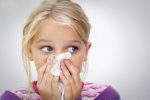Disclosure: This post was written by a trained naturopath but you should always talk to your own doctor before enlisting any medical advice.
Your child’s immune system is a highly intelligent & complex network of cells throughout their body that works to identify & destroy perceived invading pathogens. As a Naturopathic Doctor, I always try to help my patients understand that an allergy is a function of an over reactive immune system also called, a “hypersensitivity reaction”. An allergic reaction occurs when your body produces antibodies to a normally harmless substance. When your child’s immune system comes in contact with the substance (example: pollen, dust, peanuts, strawberries, dairy etc.), their immune system mounts a response in an effort to remove or neutralize that allergen.
More than ever before, children are being diagnosed with allergy & sensitivity concerns such as: asthma, eczema, hives, food & environmental sensitivities. It is estimated that 1 in 4 people suffer from allergies. Genetic predisposition is a well-known cause given that if both parents have allergies, there is 67% chance that their children will also have allergies.
That being said, the frequency & severity of allergic disorders are steadily increasing in the last 2+ decades. One theory for the steady increase in allergies is what researchers refer to as “hygiene hypothesis”. Hygiene hypothesis states that in our effort to maintain a hyper clean environment we’ve unintentionally skewed our children’s immune system to be over reactive to normally harmless substances. With hyper-clean & sterile environments, our children’s immune system is not busy fighting germs/microbes which generations upon generations before us have been. It is thought that we would be better off to allow our children to be exposed to common microbes found in soil & the rest of the environment. Bottom-line is to allow your children exposure; this will keep your child’s immune system on its toes so it does not overreact to benign substances like pollen or dust.
What Are The Signs That My Child May Have An Allergy (or Food Sensitivity)?
It’s possible that your child is experiencing allergies if you have one or more of the following symptoms:
Skin: hives, acne, eczema/dermatitis, itching, skin rash
Respiratory: allergic rhinitis (runny nose w/ clear mucus), asthma, coughing, wheezing
Gastrointestinal: indigestion & bloating, vomiting, diarrhea/constipation, irritable bowel syndrome
Mental/Emotional: anxiety, depression, hyperactivity, insomnia, irritability
Miscellaneous: eye inflammation, orbital shiners, migraines, arrhythmia, fatigue
Anaphylaxis: A severe allergic reaction can be life-threatening. If your child displays signs of difficulty breathing due to anaphylactic reaction, take her/him immediately to the emergency room of the nearest hospital.
What Are The Implications of Having Allergies?
Allergic reactions in your child can have a direct effect on chronic health problems such as: acne, ADD/ADHD, irritability, digestion, insomnia & headaches (to name a few).
When your child is exposed to his/her allergens; that creates inflammation in their system. For example, if your child is allergic to a food such as dairy, that could be causing “leaking” in the gastrointestinal lining which can prevent proper absorption of vitamins, mineral & nutrients. That is why it is very important to pay attention to any signs of immune concerns your child is presenting as well as being proactive about maintaining a diet that is low in common offenders such as dairy, processed sugars, gluten & preservatives.
Make sure to seek out a professional medical care from a health care provider to gain information on how to make useful & significant changes to your child’s diet.
What’s Next?
Even though there are many factors to consider if you suspect your child has an allergy or food sensitivity – remember that children are wonderfully vital, we just need to support their system to heal itself. Read post two in this series: PLN Parenting 101: Allergies in Kids-Prevention and Treatment.
References:
- Bone, K. & Santich, R. Phytotherapy Essentials: Healthy Children. 2008
- Murray, M. & Pizzorno, J. The Encyclopedia of Natural Medicine. Third Edition. 2012
- Zand, J., Roundtree, R.. & Walton, R. Smart Medicine for a Healthier Child. Second
Edition. 2003
*Opinions expressed are those of the author, and not necessarily those of Parent Life Network or their partners.



 Sponsored
Sponsored




